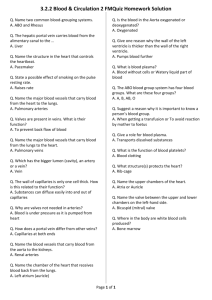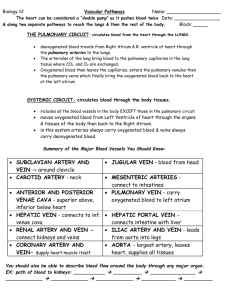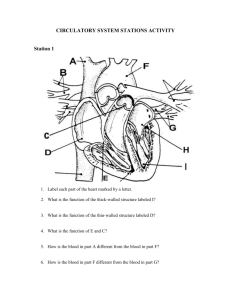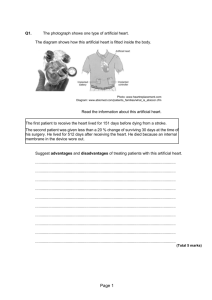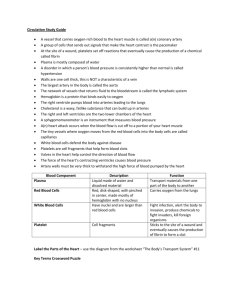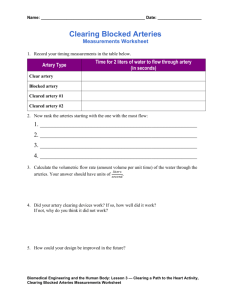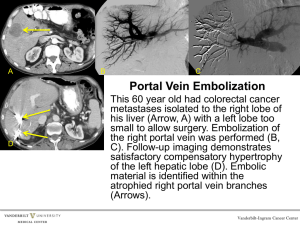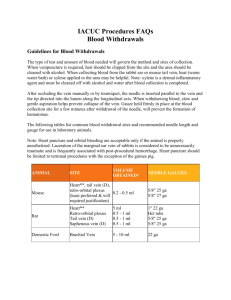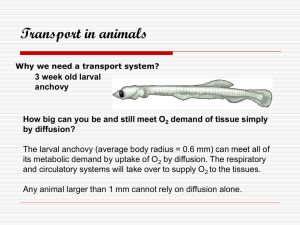4. Blood Vessel Quiz Spring 2011 A.
advertisement
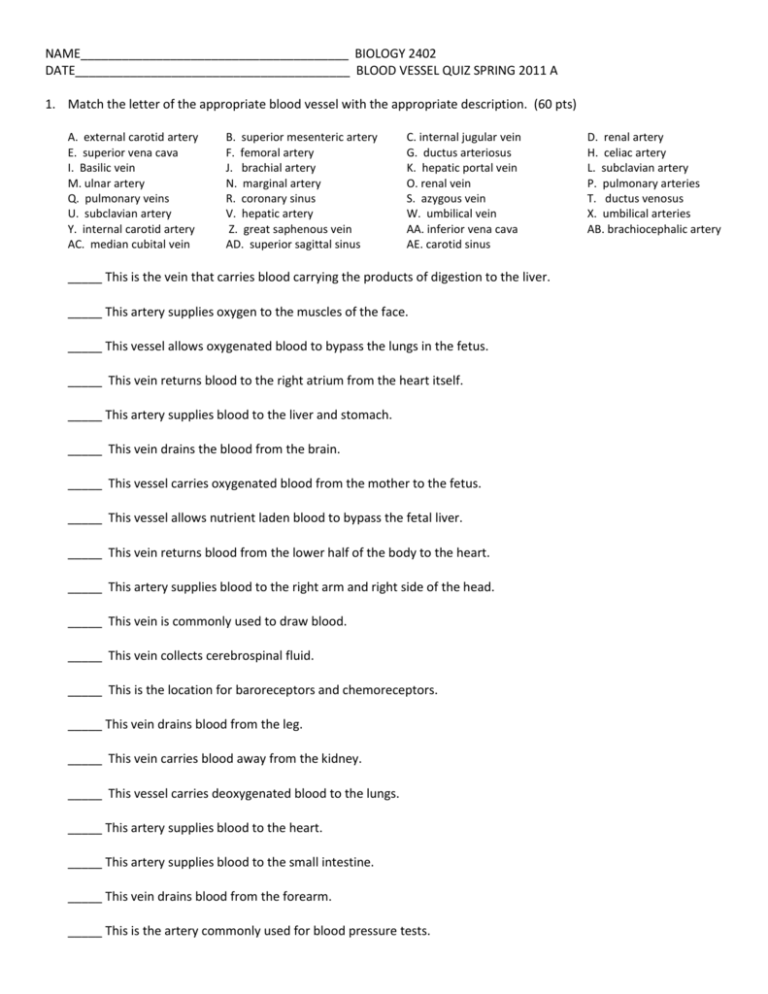
NAME_______________________________________ BIOLOGY 2402 DATE________________________________________ BLOOD VESSEL QUIZ SPRING 2011 A 1. Match the letter of the appropriate blood vessel with the appropriate description. (60 pts) A. external carotid artery E. superior vena cava I. Basilic vein M. ulnar artery Q. pulmonary veins U. subclavian artery Y. internal carotid artery AC. median cubital vein B. superior mesenteric artery F. femoral artery J. brachial artery N. marginal artery R. coronary sinus V. hepatic artery Z. great saphenous vein AD. superior sagittal sinus C. internal jugular vein G. ductus arteriosus K. hepatic portal vein O. renal vein S. azygous vein W. umbilical vein AA. inferior vena cava AE. carotid sinus _____ This is the vein that carries blood carrying the products of digestion to the liver. _____ This artery supplies oxygen to the muscles of the face. _____ This vessel allows oxygenated blood to bypass the lungs in the fetus. _____ This vein returns blood to the right atrium from the heart itself. _____ This artery supplies blood to the liver and stomach. _____ This vein drains the blood from the brain. _____ This vessel carries oxygenated blood from the mother to the fetus. _____ This vessel allows nutrient laden blood to bypass the fetal liver. _____ This vein returns blood from the lower half of the body to the heart. _____ This artery supplies blood to the right arm and right side of the head. _____ This vein is commonly used to draw blood. _____ This vein collects cerebrospinal fluid. _____ This is the location for baroreceptors and chemoreceptors. _____ This vein drains blood from the leg. _____ This vein carries blood away from the kidney. _____ This vessel carries deoxygenated blood to the lungs. _____ This artery supplies blood to the heart. _____ This artery supplies blood to the small intestine. _____ This vein drains blood from the forearm. _____ This is the artery commonly used for blood pressure tests. D. renal artery H. celiac artery L. subclavian artery P. pulmonary arteries T. ductus venosus X. umbilical arteries AB. brachiocephalic artery 2. Match the letter of the appropriate response with the correct answer. (60 pts) A. antidiuretic hormone B. vasomotor center C. baroreceptors E. chemoreceptors F. capillaries G. vasa vasorum I. arteriovenous anastomosis J. atherosclerosis K. arteriosclerosis M. arterial anastomosis N. sinusoids O. continuous Q. diastolic pressure R. systolic pressure S. angiotensin II U. atrial natriuretic hormone V. cardiogenic shock W. anaphylactic shock Y. obstructive shock Z. tachycardia AA. bradycardia AC. primary hypertension AD. portal system AE. muscular arteries AG. secondary hypertension AH. tunica interna AI. tunica externa AK. endothelium AL. smooth muscle AM. heparin D. aldosterone H. elastic arteries L. fenestrated P. edema T. epinephrine X. histamine AB. hypotension AF. lymphatic system AJ. tunica media _____ These capillaries have incomplete basement membranes, large intercellular clefts, and are found in the liver. _____ This is the term for a heart rate that is 100bpm or faster. _____ This is the term for the accumulation of excess fluid in a tissue. _____ This is a vascular pathway that involves blood passing through two capillary beds before returning to the heart. _____ This is the tissue that makes up the inner layer of the arteries. _____ This hormone is a vasodilator and results in a greater loss of urine. _____ This is the term a build-up of plaque in the walls of arteries. _____ This is the area of the medulla that controls the luminal diameter of blood vessels. _____ This is the type of shock that would result from an allergic reaction to latex. _____ This is the pressure in the arteries when the ventricles are relaxed. _____ This is the type of hypertension that is most common. _____ These are the receptor types that respond to H+, CO2, and O2. _____ This hormone is a potent vasoconstrictor. ACE inhibitors inhibit the production of this hormone. _____ This series of vessels allows the fingers and toes to be bypassed by blood when temperatures are cold. _____ Blood clots forming in veins due to reduced blood flow would be this type of shock. _____ This is the type of capillary found in the glomeruli of the kidneys. _____ This hormone increase heart rate and contractility and vasoconstricts blood vessels. _____ This system recovers the fluids not reabsorbed by the venous end of the capillaries during filtration-reabsorption. _____ These are the blood vessels that supply blood to the walls of large arteries. _____ This substance increases vessel permeability and is a vasodilator. 3. Trace a blood cell from the heart to the little finger of the left hand and back to the heart. (10 pts) a. ascending aorta d. subclavian vein g. subclavian artery j. arch of aorta m. brachiocephalic vein p. digital vein s. Superficial palmar arch (vein) b. brachial artery c. ulnar artery e. basilic vein f. cephalic vein h. ulnar vein i. median cubital vein k. axillary artery l. axillary vein n. superior vena cava o. deep palmar venous arch q. digital artery r. brachial vein t. superficial palmar arch (artery) 1. left ventricle 10. Capillaries of the finger 2. _________________________________ 11. _______________________________ 3. _________________________________ 12. _______________________________ 4. _________________________________ 13. _______________________________ 5. _________________________________ 14. _______________________________ 6. _________________________________ 15. _______________________________ 7. _________________________________ 16. _______________________________ 8. _________________________________ 17. _______________________________ 9. _________________________________ 18. _______________________________ 19. Right atrium 4. Trace a blood cell from the heart to the small intestine and back to the heart. (10 pts) a. ascending aorta b. inferior vena cava d. hepatic vein f. arch of aorta h. thoracic aorta c. superior mesenteric vein e. superior mesenteric artery g. abdominal aorta i. Hepatic portal vein 1. left ventricle 8. _____________________________ 2. ______________________________ 9. _____________________________ 3. ______________________________ 10. Capillaries of liver 4. ______________________________ 11. _____________________________ 5. ______________________________ 12. _____________________________ 6. ______________________________ 13. Right atrium 7. Capillaries of the small intestine
